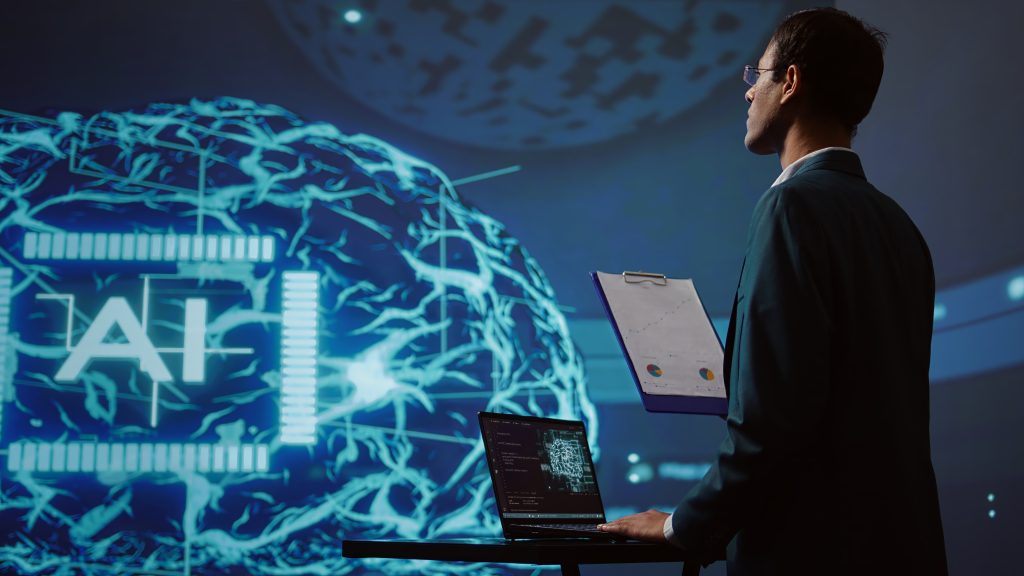From reshaping entry-level positions to creating new AI-focused roles, How AI Is Changing the Job Landscape is the question on everyone’s mind. As 2025 unfolds, we’re seeing both automation and opportunity—so let’s unpack this evolving story.

AI’s Dual Role: Automation vs. Augmentation
1. Entry-Level White-Collar Roles Under Pressure
- Experts warn that AI could eliminate up to half of all entry-level office jobs in the next five years. Anthropic’s CEO predicts significant disruption.
- Nvidia’s CEO counters, noting new job creation and productivity gains instead of outright replacement .
2. Task-by-Task Automation
- Studies show that automation targets specific tasks—not whole jobs. If AI can perform 50%+ of your tasks, displacement risk is high; below 30%, it likely becomes a productivity tool.
- McKinsey reports that AI agents now automate entire workflows—like processing payments or fraud checks—rather than only supporting human users.
Emerging Roles: Managing AI, Not Against It
3. Frontline AI Bosses
- According to Microsoft, workers are transitioning into “agent bosses,” overseeing digital colleagues that execute tasks.
- The demand for roles like prompt engineers and AI ethics stewards is rising sharply.
4. High-Skill Roles on the Upswing
- The U.S. Department of Labor projects software developer jobs will grow 17.9% by 2033—the fastest of any occupation—as leads to AI systems.
- WEF predicts net global gains: 133 million new AI-related jobs by 2025, offsetting 75 million losses.
Regional & Sector Shifts
- Harvard notes high-wage STEM roles surged from 6.5% to 10% of US jobs between 2010–2024.
- Retail sales positions fell 25% in the same period, as e-commerce and predictive AI disrupt traditional models .
- Front-line production jobs show lower AI adoption, while professional services and finance see the fastest uptake.
What Workers Need to Know
A. Adapt & Upskill
- Workers whose tasks overlap mostly with AI are most vulnerable.
- Evolution demands new skills—digital literacy, team management, ethics—especially in AI-complementary roles.
- PwC data shows wages rising twice as fast in roles exposed to AI.
B. Company Strategy Matters
- Gallup reports leadership’s AI strategy influences worker readiness and adoption: 33% of managers vs. 16% non-managers frequently use AI.
- BT and others are already offloading customer service roles to AI assistants—James at EE handles 60,000 interactions per week.
C. Policy & Public Infrastructure
- Public-private collaboration is essential to fund education and reskilling—just as Harvard and McKinsey studies emphasize broad disruption.
Practical Guide: Staying Ahead in AI’s Job Revolution
- Audit Your Tasks
- List daily responsibilities and mark those AI can handle. Over 50%? Time to pivot.
- Build AI Fluency
- Free MOOCs, bootcamps, and corporate training can boost skills in prompt engineering, data interpretation, or agent configuration.
- Seek Hybrid Roles
- Opportunities are growing in AI oversight, system maintenance, and human-centered AI functions.
- Advocate for Learning
- Influence your company or union to prioritize AI readiness programs. Leaders who embed AI guidance see more prepared teams.
- Embrace Lifelong Learning
- The evolving landscape means your career will require continuous adaptation: invest in digital literacy, ethics, management, and cross-functional ability.
- Choose AI-native Workplaces
- Growth opportunities lie with proactive digital firms—startups, fintechs, data-centric industry leaders.
Conclusion: A Landscape in Flux
How AI Is Changing the Job Landscape isn’t a future storyline—it’s happening now. Some roles are vanishing, others morphing, and entirely new careers are being born. The companies and workers who thrive will share two traits:
- They adapt quickly to AI tools.
- They leverage AI as a partner, not a rival.
Turn disruption into opportunity—because AI isn’t just reshaping jobs; it’s forging new pathways to professional growth.
References
- BT CEO warns AI could deepen job cuts (BT Group) theguardian.com+2
- Entry-level white-collar roles at risk—Anthropic & Nvidia debate nypost.com+3investopedia.com+3
- AI agent workflow capability (McKinsey) wired.com
- Software dev job growth projections (BLS) bls.gov
- STEM job growth & retail decline (Harvard Gazette) news.harvard.edu
- WEF displacement and creation figures explodingtopics.com
- PwC Global AI Jobs Barometer—wages & exposure data pwc.com+1reddit.com+1
- Gallup data on AI use in management
- Microsoft vision for “agent bosses” theguardian.com
- Government AI investments (EU, China)






